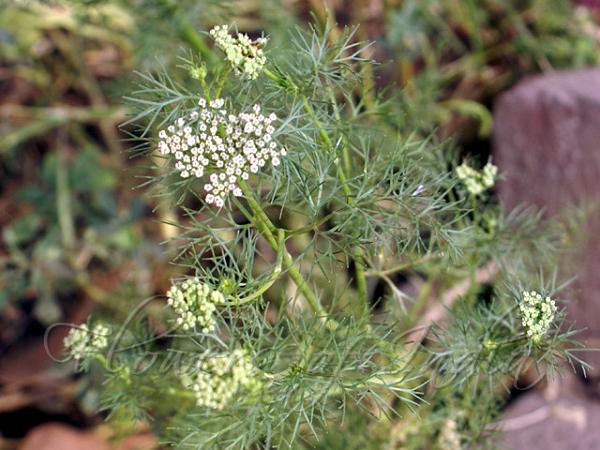|
| Ajwain |
|

|

| File size | 157168 |
| Original date | 3/16/10 8:28 PM |
| Resolution | 640 x 480 |
| Flash | Flash did not fire, auto |
| Focal length | 35.0mm |
| Exposure time | 1/160s |
| Aperture | 5.6 |
| Focus Distance | |
| Metering Mode | Multi-segment |
| Camera make | SONY |
| Camera model | DSLR-A100 |
| Sensor type |
|
|
|
|
Photo: |
Botanical name: Trachyspermum ammi Family: Apiaceae (Carrot family)
Synonyms: Carum copticum, Ligusticum ajowan, Carum ajowan
Synonyms: Carum copticum, Ligusticum ajowan, Carum ajowan
Ajwain is an erect, hairless or minutely pubescent, branched annual herb.
The stems are grooved. the leaves are rather distant, 2-3-pinnately
divided in narrow linear segments. Flowers are borne in terminal or
seemingly-lateral stalked, compound umbels, white and small. The fruits
are ovoid, aromatic, greyish brown. The mericarps, which are the
components of the fruit, are compressed, with distinct ridges and
tubercular surface, 1-seeded. This is what is used as the spice Ajwain, in
cooking. Ajwain is native to the Himalayas and parts of NW Asia.
Medicinal uses: Ajwain is also traditionally known as a
digestive aid, relieves abdominal discomfort due to indigestion and
antiseptic.
Ajwain is also traditionally known as a
digestive aid, relieves abdominal discomfort due to indigestion and
antiseptic.
Medicinal uses:
 Ajwain is also traditionally known as a
digestive aid, relieves abdominal discomfort due to indigestion and
antiseptic.
Ajwain is also traditionally known as a
digestive aid, relieves abdominal discomfort due to indigestion and
antiseptic. | Identification credit: Gurcharan Singh | Photographed in Delhi. |
• Is this flower misidentified? If yes,